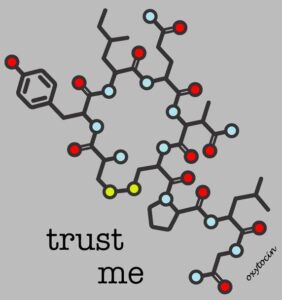 I remember the first time I heard about oxytocin.
I remember the first time I heard about oxytocin.
A personal development expert explained it was called “the love hormone.” This neurotransmitter, released by the pituitary gland, is responsible for behaviors associated with relationships and bonding.
Hug or kiss someone you love and – boom! – your oxytocin level goes up.
Research now shows that we should be boosting this at the office, too.
Oxytocin and Trust
No: I’m not suggesting that you literally love all your employees, coworkers or clients. Just know that oxytocin can cause something you want to inspire at the office: trust.
This is a big deal. A 2016 global CEO survey by PwC showed that 55% of these leaders believe that lack of trust is an important threat to their business.
Paul Zak, founder of the Center for Neuroeconomics Studies, has researched this connection. He discovered that giving people small doses of oxytocin (through nasal spray) reduces their fear of trusting a stranger (without going overboard and promoting risky behavior). It also increases a person’s empathy, which is useful when you’re trying to get people to work together.
How can we promote this – in a practical, non-drug-induced way?
What You Can Do as a Leader
Here are some specific actions Zak suggests you take to increase oxytocin – and trust.
Recognize excellence. You amplify the impact on trust when 1) you recognize people immediately after they meet a goal, 2) they receive this from their peers, 3) it’s tangible (a special gift or experience), and 4) it’s done in an unexpected, personal and public way.
Regularly share information. Only 40% of employees believe they are well informed about a company’s goals, strategies and tactics. You can’t just share these items occasionally. A worldwide study of teams showed that when supervisors communicated with their direct reports every day, engagement significantly improved.
Intentionally promote relationships. When people create relationships at work (not only focusing on completing tasks), their performance improves. Express interest in your people’s success and personal well being. Build social connections by offering lunches, after-work parties and team-building activities. When employees know you care, and they care about each other, they don’t want to let others down.
Help them grow as people. It’s no longer enough to send employees for training to promote work-related skills. Instead of spending time doing backward-looking performance reviews, talk about work/life integration and personal (as well as professional) goals. Then give them access to resources to become well-rounded people.
Show you are vulnerable. When you ask for help from colleagues, rather than just telling them what to do, their oxytocin levels go up. This increases their trust and cooperation. It’s also the sign of a secure leader.
(Read Zak’s Harvard Business Review article here.)
The #1 Oxytocin Killer
It’s stress (what a surprise). As a result, when they’re anxious or burned out, people don’t work well together. (I bet you have experienced this many times.)
In the companies Zak surveyed, the areas causing the most stress and lack of trust were 1) recognizing excellence and 2) sharing information. So start there.
The Gift that Keeps on Giving
Here’s the power of oxytocin. In companies with a high versus low atmosphere of trust:
• People reported 106% more energy
• They were 76% more engaged
• They were 50% more productive
• They were 70% more aligned with their companies’ purpose
• They felt 66% closer to their colleagues
• They had 11% more empathy for coworkers and depersonalized them 41% less
• They experienced 40% less burnout
Give your people some oxytocin today. They’ll give it back to you – and everyone else.
